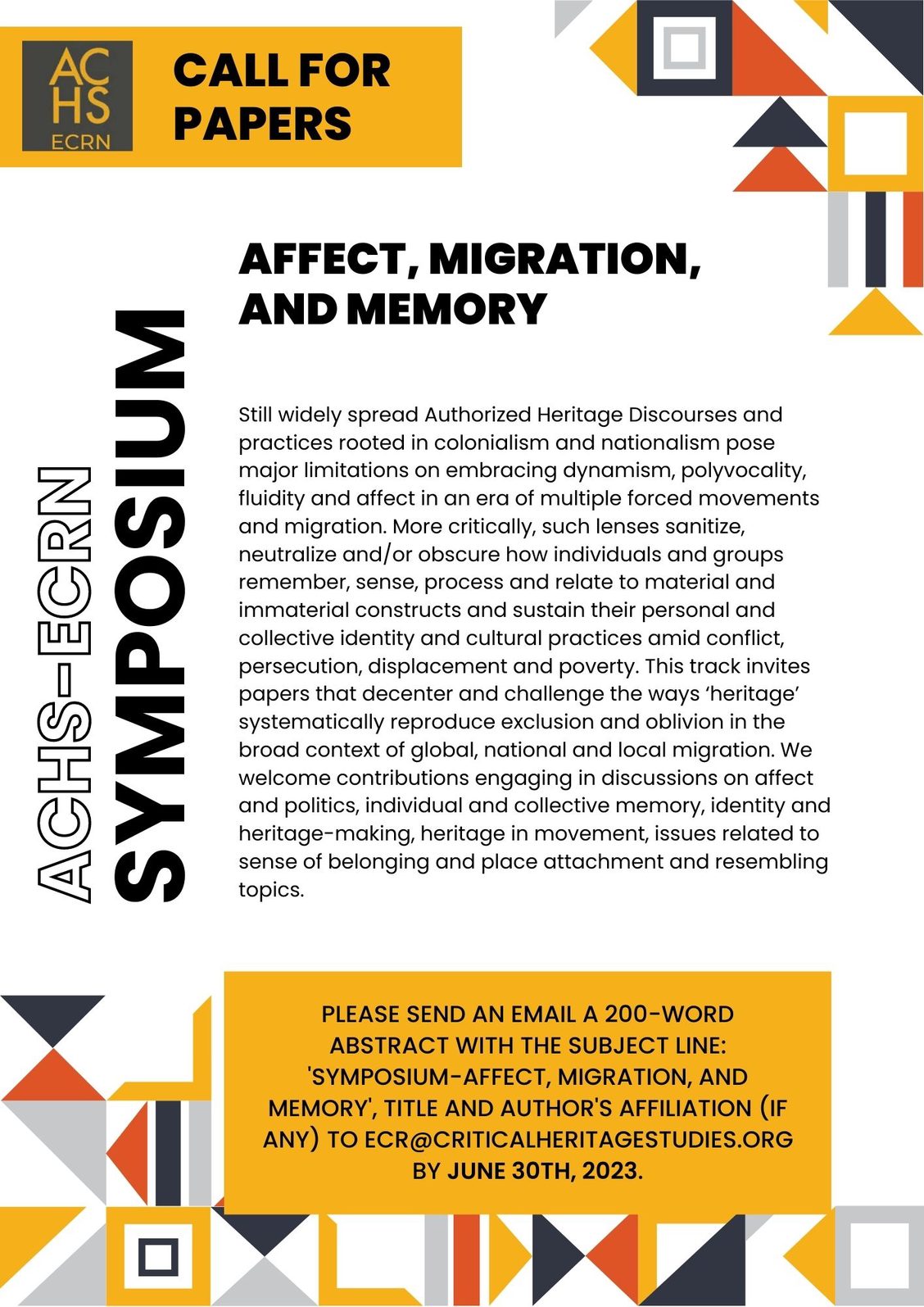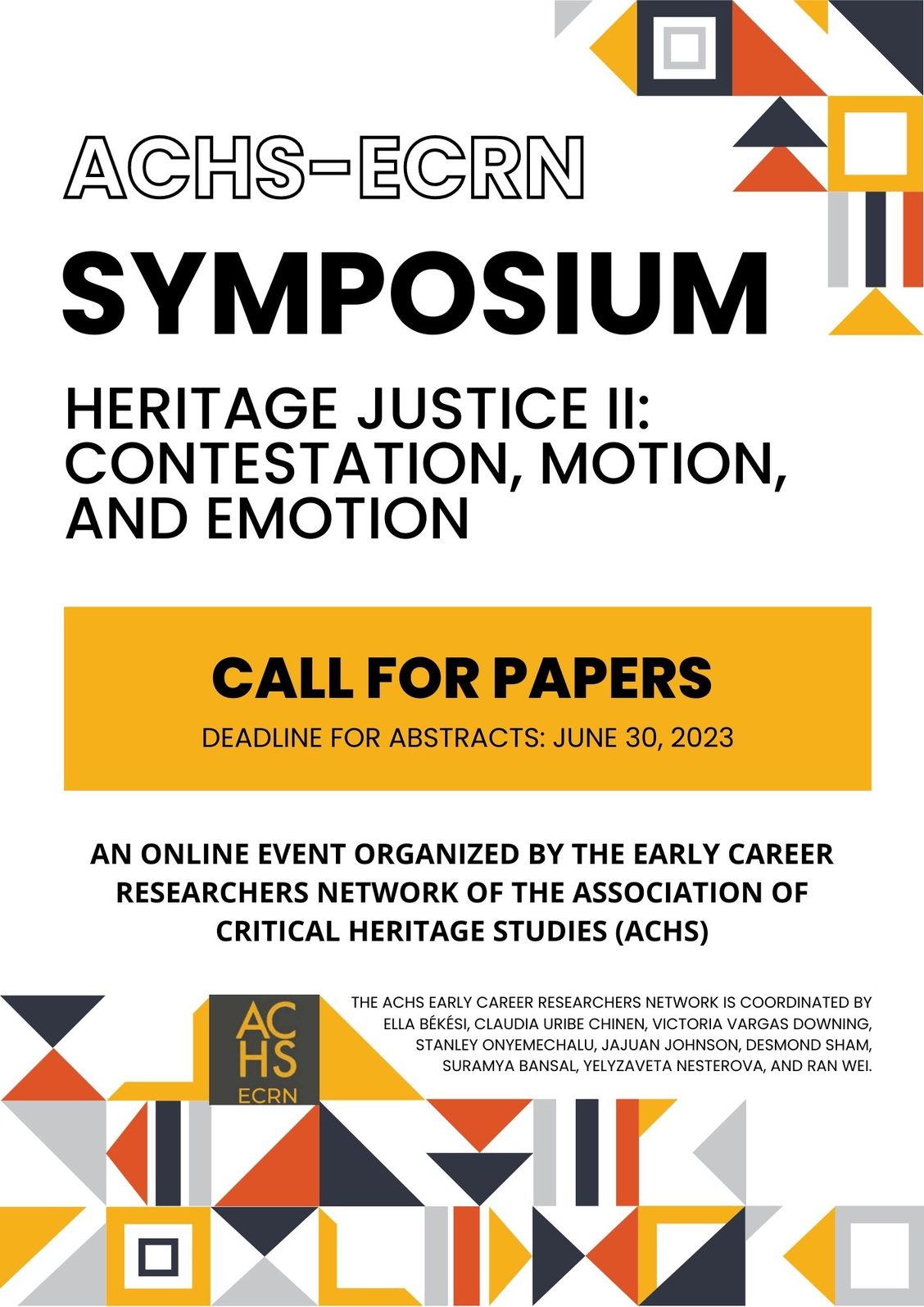Call for Papers
“Heritage Justice II: Contestation, Motion, and Emotion”
Deadline for Abstracts Submission June 30
Heritage Justice II:
Contestation, Motion, and Emotion
ACHS-ECRN Symposium 2023
(Online Event in August 2023)
Overview
As rising inequalities, discrimination, colonial practices, institutional racism, wars and conflicts, and climate change oppress marginalized groups across the globe, the role of heritage needs to be addressed, challenged, and reevaluated. While heritage regimes can maintain and create power imbalance, the politics of heritage are more than a ubiquitous dispositive of domination. The ways people understand, experience, construct and fabricate the past(s) can empower marginalized people to resist oppression and democratize heritage. At the transnational level, different nations and communities also use heritage to legitimize their claims or delegetimize or resist others, whether progressively or regressively. The Heritage Justice Series (II) will continue to explore these intricate dynamics by bringing together scholars at early career level, broadly defined, to investigate questions of power distribution of heritage making and its impacts.
Theme 1: Contested Pasts, Difficult Heritage, and (De)Colonization
[7 – 11 August]
Difficult heritage is the arena where multiple versions of the past(s), sometimes rooted in colonization and colonialism, are (re)interpreted, contested or embraced by different actors. The interpretation, contestation, and/or acceptance of difficult heritage and the dissonant past(s) embedded in it constantly shapes the historical and contemporary social and political relations of individuals, communities, and nations. In this track, we seek papers that broadly engage with contested pasts, difficult heritage, and (de)colonization in terms of the complexity and influences of the contested pasts, roles of difficult heritage in society at different scales across different times, the use and management of difficult heritage, and the decolonization practices and experiences. We welcome papers that consider non-conventional forms of contested pasts, difficult heritage, and (post)/(de)coloniality as well.
Please email a 200-word abstract with the subject line “Symposium-Contested pasts, difficult heritage and (de)colonization”, title and author’s affiliation (if any) to earlycareer@criticalheritagestudies.org by June 30th, 2023.
Theme 2: Affect, Migration and Memory
[14 – 18 August]
Still widely spread Authorized Heritage Discourses and practices rooted in colonialism and nationalism pose major limitations on embracing dynamism, polyvocality, fluidity and affect in an era of multiple forced movements and migration. More critically, such lenses sanitize, neutralize and/or obscure how individuals and groups remember, sense, process and relate to material and immaterial constructs and sustain their personal and collective identity and cultural practices amid conflict, persecution, displacement and poverty. This track invites papers that decenter and challenge the ways ‘heritage’ systematically reproduce exclusion and oblivion in the broad context of global, national and local migration. We welcome contributions engaging in discussions on affect and politics, individual and collective memory, identity and heritage-making, heritage in movement, issues related to sense of belonging and place attachment and resembling topics.
Timeline and Procedure
Please email a 200-word abstract with the subject line “Symposium-Affect, migration and memory”, title and author’s affiliation (if any) to earlycareer@criticalheritagestudies.org by June 30th, 2023.
Deadline: 30 June 2023; Email: earlycareer@criticalheritagestudies.org

